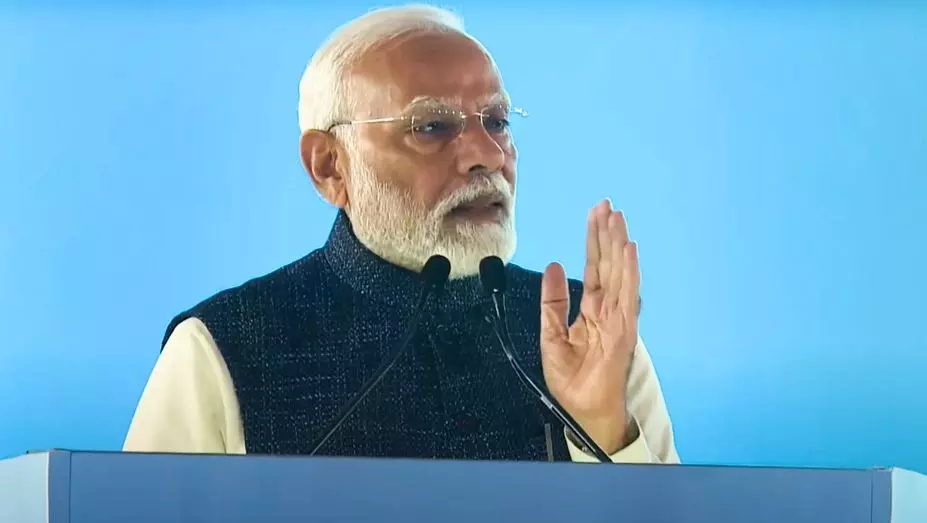New criminal laws protect civil rights: Modi

New Delhi:Prime Minister Narendra Modi on Tuesday said that the new criminal laws -- Bharatiya Nyaya Sanhita, Bharatiya Nagarik Suraksha Sanhita and Bharatiya Sakshya Adhiniyam — strengthen the spirit of “of the people, by the people, for the people,” which forms the foundation of democracy. He was speaking after dedicating to the nation the successful implementation of the three new criminal laws in Chandigarh.
The Prime Minister said that the new criminal laws represent a concrete step towards realising the ideals enshrined in the Constitution for the benefit of all citizens.
“Citizen first is the basic mantra of Nyay Sanhita,” exclaimed Modi and added that these laws were becoming the protectors of civil rights and the basis of “ease of justice”.
Emphasising that the first criterion of justice is timely justice, the Prime Minister said that the country has taken a big leap towards speedy justice by introducing the new Nyay Sanhita.
“Rules and laws are effective only when they are relevant to the times,” he said, adding that today the methods of crime and criminals had changed, which necessitated the introduction of new laws that are modern.
He remarked that the Nyay Sanhitas ensured that the law stands with the victim. The Prime Minister further mentioned that in heinous crimes against women like rape, charges will be framed within 60 days from the first hearing and it is also made mandatory to pronounce the verdict within 45 days of the completion of the hearing along with no adjournments for more than twice in any case.
These new Nyay Sanhitas came into effect on July 1, replacing the British-era Indian Penal Code, Code of Criminal Procedure and the Indian Evidence Act, respectively. Chandigarh has become the country’s first administrative unit where 100 per cent implementation of the three laws has been done.
Pointing out that these new laws signify the end of colonial-era laws, Modi said that the colonial-era laws were the medium of atrocities and exploitation committed by the British when they ruled over India.
“The 1857 revolution shook the roots of British rule and in 1860 they brought the IPC and later, the Indian Evidence Act and the CrPC framework came into being. The purpose of those laws was to punish Indians and keep them enslaved,” the Prime Minister said.
Emphasising that the country should now come out of that colonial mindset, the Prime Minister urged that the strength of the nation should be used in nation building, which necessitated national thinking.
The Prime Minister recalled that during his Independence Day speech this year, he had pledged to the country to get rid of the mentality of slavery. He underlined that with the implementation of the new Nyay Sanhitas, the country had taken another step forward in that direction.
Noting that the Nyay Sanhita is woven with the ideas of equality, harmony and social justice, Modi said that despite everyone being equal in the eyes of the law, the practical reality was different. He stated that the poor were afraid of the laws, stepping into the court or a police station even.
The Prime Minister noted that the new Nyaya Sanhita will work to change the psychology of the society and every poor person will have faith that the law of the country is a guarantee of equality. “This embodied the true social justice assured in our Constitution,” he said.
Underlining that the three laws had sensitivity towards every victim, the Prime Minister stressed that it is imperative for the citizens of the country to know its details.
Modi mentioned that a system had been created to take action against the person who obstructs the work of the police and a separate chapter was introduced to ensure the safety of women, including their rights and safety at the workplace, home and in society.
Noting that the law of the country is for the citizens, the Prime Minister said that therefore, legal processes should also be for the convenience of the public. Highlighting the lacunae in the Indian Penal Code and the fear of the law for the honest people as against the criminals, Modi said that the new Nyay Sanhitas has freed the people from such troubles and the government has abolished more than 1,500 old laws of British rule.
Modi urged that there is a need to broaden our perspective so that the law becomes a medium of citizen empowerment in our country. He stated that there were many laws that lacked discussions and deliberations.
Citing the example of the abrogation of Article 370 and Triple Talaq, Modi said there were a lot of discussions on them and these days, the law related to the Waqf Board is also being debated.

